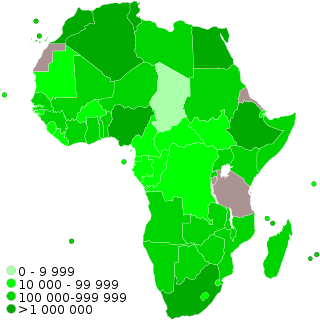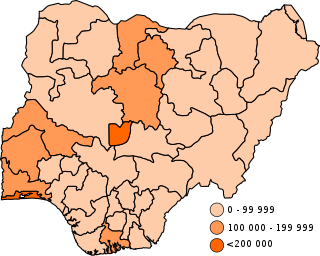Background
Vaccines on order
Cape Verde is in negotiations with vaccine manufacturers. [2] It intends to receive 267,293 vaccine doses through the COVAX pillar. [3]
| Vaccine | Approval | Deployment |
|---|---|---|
| Oxford–AstraZeneca | ||
| Pfizer–BioNTech | ||
Cape Verde has begun vaccinations against COVID-19. [1]
| Date | 19 March 2021 - present |
|---|---|
| Location | Cape Verde |
| Cause | COVID-19 pandemic |
Cape Verde is in negotiations with vaccine manufacturers. [2] It intends to receive 267,293 vaccine doses through the COVAX pillar. [3]
| Vaccine | Approval | Deployment |
|---|---|---|
| Oxford–AstraZeneca | ||
| Pfizer–BioNTech | ||
Cape Verde is in negotiations with vaccine manufacturers. [2] Courtesy of COVAX it received 24,000 doses of the Oxford–AstraZeneca COVID-19 vaccine on 12 March and 5,850 doses of the Pfizer–BioNTech COVID-19 vaccine on 14 March. [3] Vaccinations commenced on 19 March. [4] By the end of the month 3,699 vaccine doses had been administered. [5]
By 19 April, 8,330 persons had been inoculated, most of whom with the Oxford–AstraZeneca vaccine. [4] By the end of the month 15,780 vaccine doses had been administered. [5]
21,318 vaccine doses had been administered by 12 May. By the end of the month 27,276 vaccine doses had been administered. [5]
By the end of the month 86,434 vaccine doses had been administered. [5]
By the end of the month 173,183 vaccine doses had been administered. [5]
By the end of the month 296,476 vaccine doses had been administered. [5]
By the end of the month 414,300 vaccine doses had been administered. [5]
By the end of the month 504,434 vaccine doses had been administered. 94% of the targeted population had been fully vaccinated. [5]
By the end of the month 544,075 vaccine doses had been administered. By mid-November, the entire targeted population had been fully vaccinated. [5]
By the end of the month 571,130 vaccine doses had been administered. The entire targeted population was fully vaccinated. [5]
By the end of the month 611,615 vaccine doses had been administered. The entire targeted population was fully vaccinated. [5]
By the end of the month 704,843 vaccine doses had been administered. The entire targeted population was fully vaccinated. [5]
By the end of the month 728,077 vaccine doses had been administered. The entire targeted population was fully vaccinated. [5]
By the end of the month 752,194 vaccine doses had been administered. The entire targeted population was fully vaccinated. [5]
Cumulative vaccinations
Graphs are unavailable due to technical issues. There is more info on Phabricator and on MediaWiki.org. |
The COVID-19 vaccination program in the Philippines was a mass immunization campaign against severe acute respiratory syndrome coronavirus 2 (SARS-CoV-2), the virus that causes coronavirus disease 2019 (COVID-19), in response to the pandemic in the country. The vaccination program was initiated by the Duterte administration on March 1, 2021, a day after the arrival of the country's first vaccine doses which were donated by the Chinese government.

The general COVID-19 vaccination in Australia program began on 22 February 2021 in response to the COVID-19 pandemic, with the goal of vaccinating all willing people in Australia before 2022. Front-line workers and aged care staff and residents had priority for being inoculated, before a gradual phased release to less-vulnerable and lower-risk population groups throughout 2021. The Therapeutic Goods Administration (TGA) approved four vaccines for Australian use in 2021: the Pfizer–BioNTech vaccine on 25 January, the Oxford–AstraZeneca vaccine on 16 February, Janssen vaccine on 25 June and the Moderna vaccine on 9 August. Although approved for use, the Janssen vaccine was not included in the Australian vaccination program as of June 2021.
On 29 January 2021, Algeria launched a COVID-19 vaccination campaign, a day after receiving its first shipment of 50,000 doses of the Russia's Sputnik V vaccine. As of 6 June 2021, around 2.5 million doses have been administered. Algeria is currently vaccinating its population with both Sputnik V and Oxford-AstraZeneca vaccines.
The COVID-19 vaccination in Morocco is an ongoing immunisation campaign against severe acute respiratory syndrome coronavirus 2 (SARS-CoV-2), the virus that causes coronavirus disease 2019 (COVID-19), in response to the ongoing pandemic in the country.
COVID-19 vaccination in Angola is an ongoing immunisation campaign against severe acute respiratory syndrome coronavirus 2 (SARS-CoV-2), the virus that causes coronavirus disease 2019 (COVID-19), in response to the ongoing pandemic in the country. As of 15 June 2021, Angola has administered 1,314,375 doses of vaccines.822,109 people with the first dose and 492,266 people fully vaccinated. Angola began their vaccination program shortly after receiving their first shipment of Oxford AstraZeneca vaccine in early March 2021.
COVID-19 vaccination in Botswana is an ongoing immunisation campaign against severe acute respiratory syndrome coronavirus 2 (SARS-CoV-2), the virus that causes coronavirus disease 2019 (COVID-19), in response to the ongoing pandemic in the country.

Burkina Faso started vaccinating against COVID-19 on 2 June 2021.
On 23 February 2021, Senegal began its national vaccination program against the COVID-19. As of 10 March, 68,205 people in Senegal have been able to be vaccinated.

COVID-19 vaccination programs are ongoing in the majority countries and territories in Africa, with 51 of 54 African countries having launched vaccination programs by July 2021. As of October 2023, 51.8% of the continent's population is fully vaccinated with over 1084.5 million doses administered.

COVID-19 vaccination in Ghana began on Monday 1 March 2021 after the country became the first recipient of the Oxford-AstraZeneca COVID-19 vaccine as part of the COVAX initiative. As of 6 June 2021, Ghana has administered 1,230,000 vaccine doses.

Bhutan has promised a free COVID-19 vaccination to all of its citizens, both inside and outside the country. It started mass vaccinations on 27 March 2021.

The COVID-19 vaccination in Indonesia is an ongoing mass immunization in response to the COVID-19 pandemic in Indonesia. On 13 January 2021, the program commenced when President Joko Widodo was vaccinated at the presidential palace. In terms of total doses given, Indonesia ranks third in Asia and fifth in the world.

COVID-19 vaccination in Nigeria is an ongoing immunization campaign against severe acute respiratory syndrome coronavirus 2 (SARS-CoV-2), the virus that causes coronavirus disease 2019 (COVID-19), in response to the ongoing pandemic in the country. Vaccination began on 5 March 2021. As of 28 February 2022, 17,914,944 people have received their first dose a COVID-19 vaccine, and 8,197,832 have received their second dose.

Bangladesh began the administration of COVID-19 vaccines on 27 January 2021 while mass vaccination started on 7 February 2021.
COVID-19 vaccination in Djibouti is an ongoing immunisation campaign against severe acute respiratory syndrome coronavirus 2 (SARS-CoV-2), the virus that causes coronavirus disease 2019 (COVID-19), in response to the ongoing pandemic in the country.
COVID-19 vaccination in Egypt is an ongoing immunisation campaign against severe acute respiratory syndrome coronavirus 2 (SARS-CoV-2), the virus that causes coronavirus disease 2019 (COVID-19), in response to the ongoing pandemic in the country.
COVID-19 vaccination in Eswatini is an ongoing immunisation campaign against severe acute respiratory syndrome coronavirus 2 (SARS-CoV-2), the virus that causes coronavirus disease 2019 (COVID-19), in response to the ongoing pandemic in the country.
COVID-19 vaccination in the Democratic Republic of the Congo is an ongoing immunisation campaign against severe acute respiratory syndrome coronavirus 2 (SARS-CoV-2), the virus that causes coronavirus disease 2019 (COVID-19), in response to the ongoing pandemic in the country.
The COVID-19 vaccination campaign began in Fiji on the first quarter of 2021 and will continue throughout the year with the goal of vaccinating all eligible Fijians. The government has made it mandatory for all eligible adults to take the COVID-19 vaccines.
COVID-19 vaccination in Ontario began in December 2020, when the first doses of the Pfizer vaccine were administered. In February 2021, shipments for both the Pfizer and Moderna vaccines increased significantly. By May 2021, over 50 percent of Ontarians had received their first dose. By the beginning of 2022, over 80 percent of Ontarians had received their first dose.